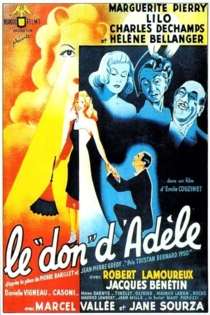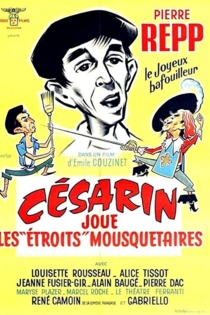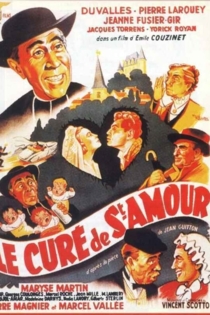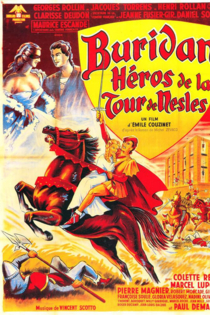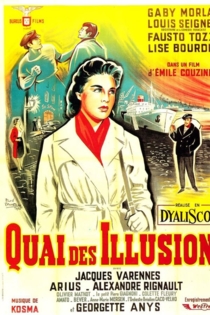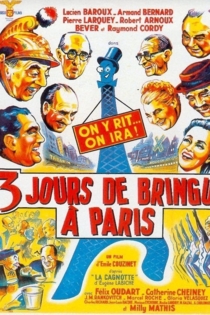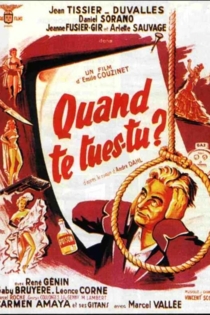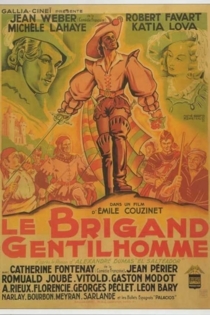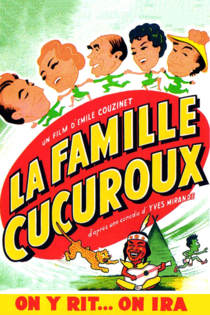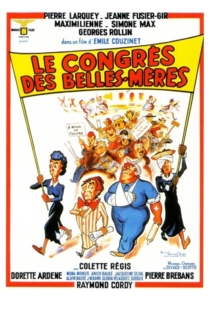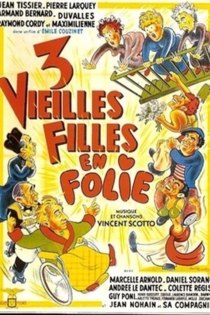
Émile Couzinet
1896 - 1964Fils d'un menuisier, Couzinet devient projectionniste ambulant puis directeur du Casino de Royan.
Dans les années 1920, il décide d’investir dans l’exploitation de salles de cinéma, y compris d'art et d'essai. En 1930, à cause de la concurrence effrénée des barrières de Bordeaux, il acquiert ses propres studios, les Studios de la Côte de Beauté, un complexe cinématographique installé dans la station balnéaire de Royan. Après la destruction de la ville à l'issue de la seconde guerre mondiale, il récrée ses studios à Bordeaux, qui prennent alors le nom des Studios de la Côte d'Argent.
Il produit lui-même des vaudevilles dont il est aussi le scénariste (à l'occasion sous le nom de Robert Eyquem) parfois au premier degré ou un peu grivois, souvent adaptés du théâtre de boulevard. Ainsi, Trois Jours de bringue à Paris est une adaptation de La Cagnotte d'Eugène Labiche alors que Le Don d'Adèle est inspiré d'une pièce de Pierre Barillet et de Jean-Pierre Grédy.
Pilier représentatif du cinéma populaire – son slogan est « On y rit, on ira » –, il produit des films jubilatoires dont Le Club des fadas, Trois Vieilles Filles en folie, La Famille Cucuroux, Le Congrès des belles-mères, ou encore Mon curé champion du régiment. Si la comédie est son domaine de prédilection, Couzinet touche aussi à d'autres genres comme le film de cape et d'épée (Buridan, héros de la Tour de Nesle), l'adaptation littéraire (Colomba d'après Prosper Mérimée) ou le mélodrame familial (Quai des illusions, film pour lequel il emploie comme assistant un certain Sergio Leone).
Il fait tourner de grands noms du cinéma de l'époque, comme Pierre Larquey, Jeanne Fusier-Gir ou Gaby Morlay. Mais il suscite également les débuts d'acteurs truculents tels Jean Carmet, qui apparait dans Mon curé champion du régiment et Robert Lamoureux, qui tient son propre rôle dans Le Don d'Adèle.
L'empire Couzinet périclite progressivement à partir de la fin des années 1950 dans le contexte de concentration de l'industrie cinématographique.
L'intrigante
Émile Couzinet
Germaine Aussey, Paul Cambo
A father falls in love with his son's mistress whom he has forced to emigrate to force him to break up. More carefree than a schoolboy, he ruins himself for the beauty who soon chases him away. The family will soon be reunited permanently.
L'intrigante
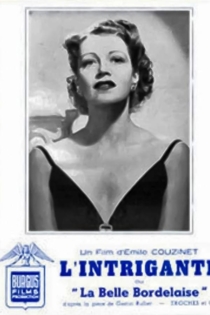
Trois marins en bordée
Émile Couzinet
Alain Baugé, Pierre Brebans
The marchioness of Botarin secretly exchanges passionate letters with Jean, a young sailor. What Jean doesn't know is that the lady of his heart is twice as old as he thinks, for the photo she has sent her was one of her young niece Jacqueline, instead of her. Things get complicated when Jean turns up at the Botarin manor, escorted by two other sailors. The young man immediately falls under the spell of Jacqueline, which drives the marchioness crazy. The latter resorts to various subterfuges to separate the lovebirds, but to no avail. She will end up marrying a gendarme who has been her suitor for years while Jean weds his beloved Jacqueline.
Trois marins en bordée
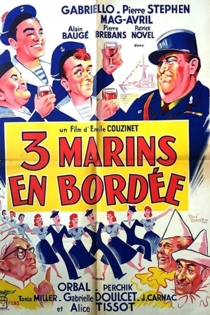
Hyménée
Émile Couzinet
Gaby Morlay, Maurice Escande
Although Pierre is married, he is in love with his sister in law Marianne, while he is loved by his cousin Agnés, a spinster. Marianne loves him but she prefers to marry Rémy, and ultimately Agnés leaves Pierre to his wife and kids.
Hyménée
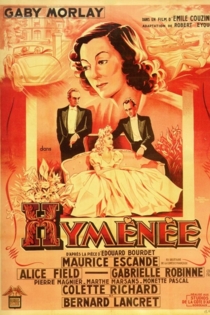
Ce coquin d'Anatole
Émile Couzinet
Frédéric Duvallès, Armand Bernard
Anatole, quivering nostrils and greedy lips, is the resourceful clerk of Mrs. Paufilat, a butcher. It takes a fancy to take on the identity of the Paufilat son, Paul. He must then undergo the assaults of the tumultuous Germaine, exhilarated by the money of Paul Paufilat.
This Rascal of Anatole
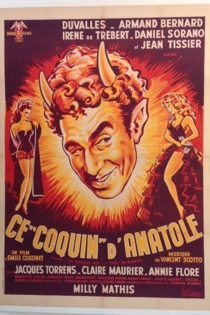
Colomba
Émile Couzinet
José Luccioni, Catherine Damet
The film is set shortly after the 1815 Battle of Waterloo, around 1818, in which the hero Lieutanatn Orso fought for the French. In Marseille, returning to Corsica and his family estate, of which is now the head, Orso meets the Irish widower Colonel Sir Thomas Nevil and his beautiful daughter Lydia. The Colonel also fought for the British at Waterloo and they strike up a military-based friendship. They also share a passion for hunting. Orso convinces the colonel to come and hunt there. France ruled Corsica then, as they still do. Sadly, in his absence Orso's father has been assassinated by the influential Barracini family. Orso's sister Colomba is bent on him revenging the murder - in the Sicilian vendetta style. Orso doesn't agree with these old ways and the scene is set for a terrible conflict involving Corsican bandits and the French prefect. The book was made into an Italian one with the same title in 1948 and remade in 1950 in Hollywood under the name of "Vendetta".
Colomba
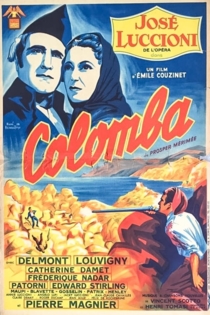
Le don d'Adèle
Émile Couzinet
Marguerite Pierry, Lilo
This is the disaster for the Veyron-Lafitte. Régine, the maid, has just given up her apron and the meal is not ready for the dinner guests, the Gachassins. Adèle arrives at their house as a maid and saves the day. Very quickly, the masters of the place realize that she has the gift of seeing the future. Adèle predicts that the Gachassins will not come, which will be verified.
Le don d'Adèle
